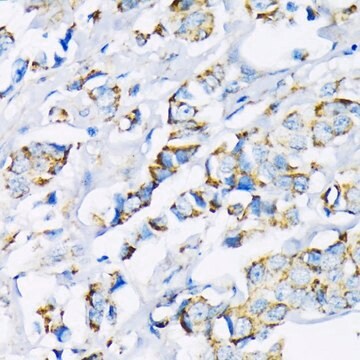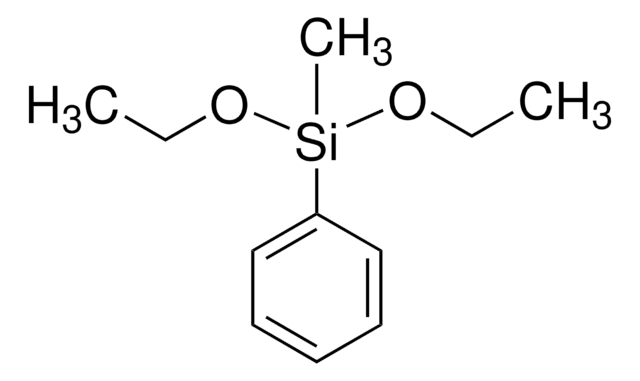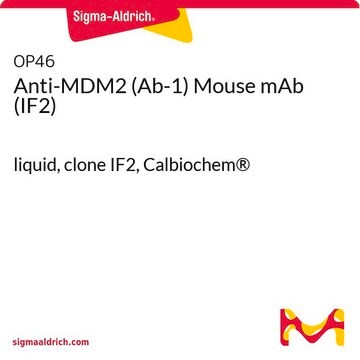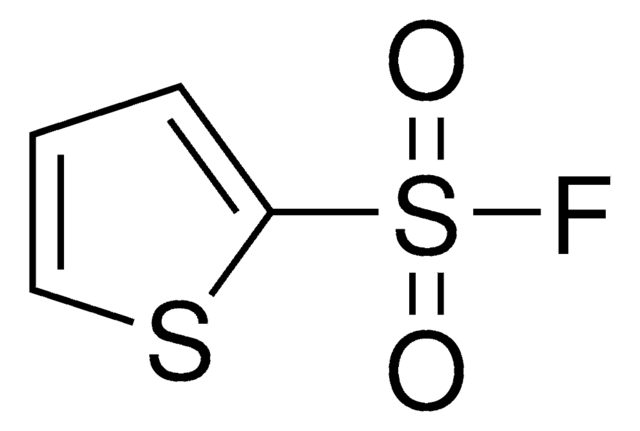추천 제품
생물학적 소스
rabbit
Quality Level
항체 형태
serum
항체 생산 유형
primary antibodies
클론
polyclonal
종 반응성
rat, human
제조업체/상표
Chemicon®
기술
ELISA: suitable
immunocytochemistry: suitable
western blot: suitable
NCBI 수납 번호
UniProt 수납 번호
배송 상태
wet ice
타겟 번역 후 변형
unmodified
유전자 정보
human ... HK2(3099)
특이성
Reacts with the Type II isozyme of rat hexokinase (102 kDa). No reactivity with the Type I or Type III isozymes of rat hexokinase by immunoblot or ELISA. Reactivity with human and hamster Type II isozyme has been confirmed by immunoblotting, and reactivity with Type II isozyme from other mammalian species is expected.
면역원
Recombinant rat Type II hexokinase.
애플리케이션
Anti-Hexokinase Type II Antibody is an antibody against Hexokinase Type II for use in ELISA, IC & WB.
Research Category
Metabolism
Metabolism
Research Sub Category
Enzymes & Biochemistry
Enzymes & Biochemistry
Western Blot: 1:5,000-1:10,000.
Immunocytochemistry using indirect immunofluorescence.
ELISA
Optimal working dilutions must be determined by the end user.
Immunocytochemistry using indirect immunofluorescence.
ELISA
Optimal working dilutions must be determined by the end user.
표적 설명
102 kDa
물리적 형태
Format: Purified
Immunodepleted Serum
Liquid. Partially Purified rabbit Serum. Antibodies reactive with the Type I isozyme were present in the original antiSerum; these were removed by affinity chromatography on a column of immobilized Type I isozyme, and the affinity-depleted Serum restored to original volume.
저장 및 안정성
Maintain for 1 year at -20°C from date of shipment. Aliquot to avoid repeated freezing and thawing. For maximum recovery of product, centrifuge the original vial after thawing and prior to removing the cap.
분석 메모
Control
insulin-responsive tissues such as skeletal muscle
insulin-responsive tissues such as skeletal muscle
기타 정보
Concentration: Please refer to the Certificate of Analysis for the lot-specific concentration.
법적 정보
CHEMICON is a registered trademark of Merck KGaA, Darmstadt, Germany
면책조항
Unless otherwise stated in our catalog or other company documentation accompanying the product(s), our products are intended for research use only and are not to be used for any other purpose, which includes but is not limited to, unauthorized commercial uses, in vitro diagnostic uses, ex vivo or in vivo therapeutic uses or any type of consumption or application to humans or animals.
Not finding the right product?
Try our 제품 선택기 도구.
Storage Class Code
10 - Combustible liquids
시험 성적서(COA)
제품의 로트/배치 번호를 입력하여 시험 성적서(COA)을 검색하십시오. 로트 및 배치 번호는 제품 라벨에 있는 ‘로트’ 또는 ‘배치’라는 용어 뒤에서 찾을 수 있습니다.
Yuya Nogami et al.
BMC medical imaging, 16, 31-31 (2016-04-27)
We report two cases of anisakiasis lesions that were initially suspected to be recurrence of gynecological cancer by positron emission tomography-computed tomography (PET-CT). Both cases were extragastrointestinal anisakiasis that is very rare. The first case was a patient with endometrial
Wenshan Hao et al.
The Journal of biological chemistry, 285(17), 12647-12654 (2010-01-30)
Cancer cells constantly adapt to oxidative phosphorylation (OXPHOS) suppression resulting from hypoxia or mitochondria defects. Under the OXPHOS suppression, AMP-activated protein kinase (AMPK) regulates global metabolism adjustments, but its activation has been found to be transient. Whether cells can maintain
Santosh K Maurya et al.
Cell reports, 24(11), 2919-2931 (2018-09-13)
The major objective of this study was to understand the molecular basis of how sarcolipin uncoupling of SERCA regulates muscle oxidative metabolism. Using genetically engineered sarcolipin (SLN) mouse models and primary muscle cells, we demonstrate that SLN plays a crucial
Stephanie E Siegmund et al.
Human molecular genetics, 26(23), 4588-4605 (2017-10-04)
Mitochondrial disorders affecting oxidative phosphorylation (OxPhos) are caused by mutations in both the nuclear and mitochondrial genomes. One promising candidate for treatment is the drug rapamycin, which has been shown to extend lifespan in multiple animal models, and which was
Chung-Ling Lu et al.
PloS one, 10(3), e0121046-e0121046 (2015-03-26)
A unique feature of cancer cells is to convert glucose into lactate to produce cellular energy, even under the presence of oxygen. Called aerobic glycolysis [The Warburg Effect] it has been extensively studied and the concept of aerobic glycolysis in
자사의 과학자팀은 생명 과학, 재료 과학, 화학 합성, 크로마토그래피, 분석 및 기타 많은 영역을 포함한 모든 과학 분야에 경험이 있습니다..
고객지원팀으로 연락바랍니다.








